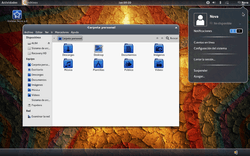Nova (operating system)
 | |
|
Nova 4.0 | |
| Developer | University of Information Science |
|---|---|
| OS family | Linux |
| Working state | Active |
| Source model | Open source |
| Initial release | February 2009 |
| Latest release | 4.0 (2013) / March 22, 2013 |
| Available in | Multilingual |
| Platforms | IA-32, x86-64 |
| Kernel type | Monolithic (Linux) |
| License | GNU GPL |
| Official website | www.nova.cu |
Nova is a Cuban state-sponsored Linux distribution launched in February 2009.[1][2] It is developed in Havana at the University of Information Science (UCI) by students and professors to provide free/libre/open-source software (FLOSS) to inexperienced users and Cuban institutions. While the initial version was Gentoo-based, the developers switched to Ubuntu beginning with Version 2.1[3]
Goal and adoption
The goal of Nova is to achieve "sovereignty and technological independence"[3] and to have it installed on all computers in Cuba where Microsoft Windows still is the most widely used operating system.[4][5] The system is central to the Cuban government's desire to replace Windows.[1] Hector Rodriguez, Director of UCI, said that "[t]he free software movement is closer to the ideology of the Cuban people, above all for the independence and sovereignty."[4] Other cited reasons to develop the system include the United States embargo against Cuba which has made it hard for Cubans to buy and update Windows, as well as potential security issues feared by the Cuban government because of the U.S. Government's alleged access to Microsoft's source code.[1][5]
Cuba is planning to convert to Nova as its main operating system; once the migration is complete it will be installed in 90% of all work places.[6][7] By early 2011 the UCI announced that they would migrate more than 8000 computers to the new operating system.[8] Beginning in 2011, new computers will come installed with both Windows and Nova.[7]
Software
The first version of Nova, called Baire, is based on Gentoo Linux, while Nova 2.1 Desktop Edition is based on Ubuntu.[1][9] Nova Escritorio is UCI's office suite meant to replace Microsoft Office.[7]
Versions
Currently the developers are working on Version 5.0 aka "Nova 2015", which will be a major update.[10]
| Version | Codename | Date |
|---|---|---|
| Old version, no longer supported: 1.1.2 | Baire | 20 February 2009 |
| Old version, no longer supported: 2.0 | 2 December 2009 | |
| Old version, no longer supported: 2.1 | 4 June 2010 | |
| Old version, no longer supported: 2011-beta3 | 12 February 2011 | |
| Old version, no longer supported: 3.0 (2011) | 2011 | |
| Current stable version: 4.0 (2013) | 22 March 2013 | |
| Legend: Old version Latest version | ||
See also
References
- ↑ 1.0 1.1 1.2 1.3 Israel, Esteban (11 February 2009). "Cuba launches own Linux variant to counter U.S.". Reuters. Retrieved 24 May 2011.
- ↑ Timothy Prickett Morgan (12 February 2009). "Cuba crafts extra-communist Linux distro: Down with the Microsoft bourgeoisie". The Register. Retrieved 24 May 2011.
- ↑ 3.0 3.1 "Who are we?". Nova — Distribución Cubana de GNU/Linux. n.d. Retrieved 24 May 2011.
- ↑ 4.0 4.1 Connors, Devin (17 February 2009). "Cuba Declares War on Windows: The land of Castro has gone open source". Tom's Hardware. Retrieved 24 May 2011.
- ↑ 5.0 5.1 Brown, Eric. "Cuba launches Gentoo Linux distro". Retrieved 24 May 2011.
- ↑ "Cuba sets to migrate to free, open-source software". Xinhua News Agency. 29 December 1010. Retrieved 24 May 2011.
- ↑ 7.0 7.1 7.2 "Cuba presents Linux-based operating system". Cuba Standard. 10 February 2011. Retrieved 24 May 2011.
- ↑ "Cuba: 8000 computadoras de la Universidad de Ciencias Informáticas migraran a Nova GNU/Linux" (in Spanish). Somos Libres. 11 February 2011. Retrieved 24 May 2011.
- ↑ "Productos" (in Spanish). Nova — Distribución Cubana de GNU/Linux. n.d. Retrieved 24 May 2011.
- ↑ El nuevo shell de Nova Escritorio ya se encuentra en desarrollo, HumanOS.cu
External links
| Wikimedia Commons has media related to Nova (linux). |
